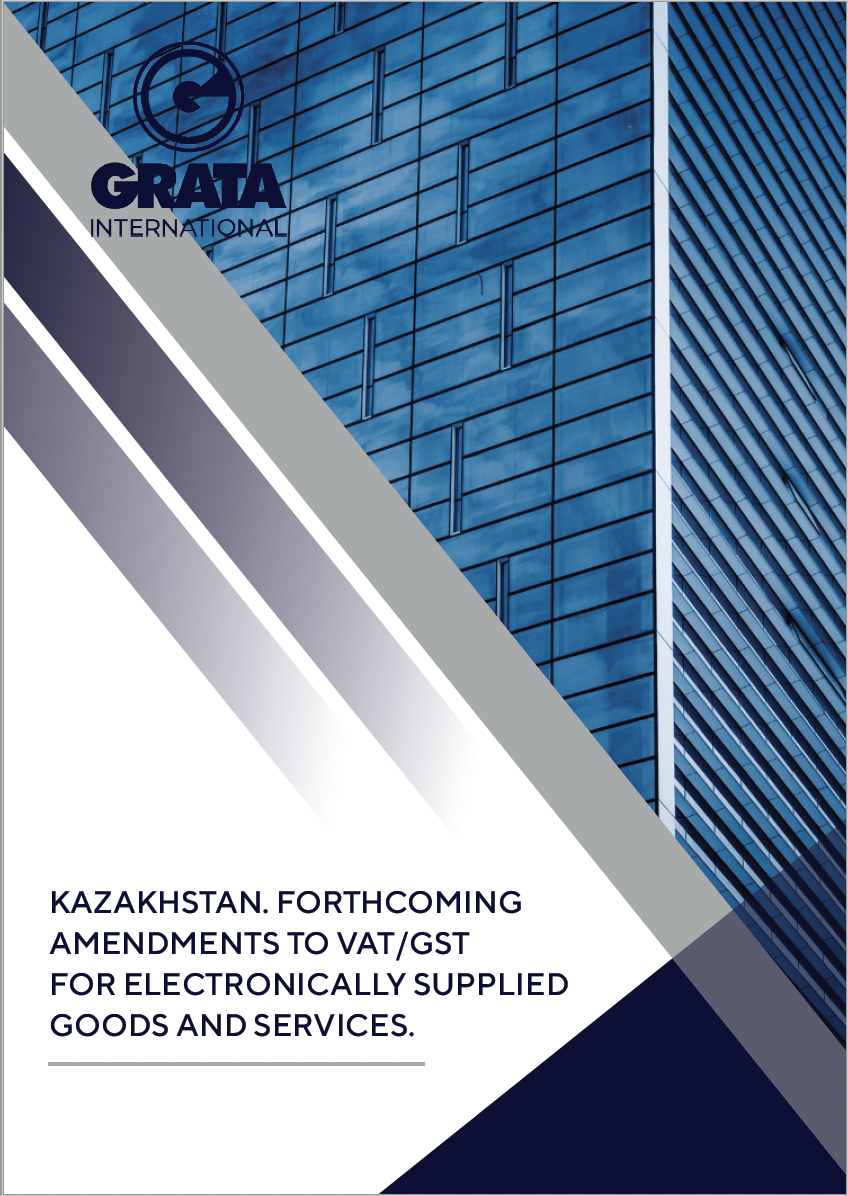Kazakhstan. Forthcoming Amendments to VAT/GST
for Electronically Supplied Goods and Services

Almost a year ago, Kazakhstan introduced VAT which the foreign companies should pay for goods and services supplied electronically to individuals in Kazakhstan[1]. According to new Section 25 of the Tax Code[2], the VAT obligation related to electronic supplies of goods and services arises if:
- e-commerce and e-services are provided through the Internet platform of the foreign company, and
- a user of e-services and(or) buyer of e-goods is an individual.
The individual’s bond with Kazakhstan is based either on his/her residence or the purchase of e-goods and e-services by using either of (i) Kazakhstani international country telephone (mobile operator) code, (ii) network address registered in Kazakhstan, (iii) payments systems and bank accounts located in Kazakhstan.
While the Tax Code provides for a traditional VAT registration regime for taxpayers, the foreign companies that electronically supply goods and services should go through conventional registration for VAT payment purposes. Under Article 778 of the Tax Code, the foreign company should send a paper confirmation letter for the conventional registration. However, neither the Tax Code nor the Kazakhstani Ministry of Finance specifies which tax authority’s level the foreign company should send the confirmation letter to[3]. For conventional registration the foreign company’s letter should indicate:
- company’s name,
- taxpayer’s number in the country of residence (if any),
- public number of company’s incorporation in the country of residence,
- banking requisites for VAT payment, postal address and e-mail.
It is worth noting that the Kazakhstani Parliament considers a draft law[4] and plans to add the foreign company’s Merchant ID[5] number and requisites for payment or money transfer receipt to the list of data required for conditional registration[6].
In addition, the draft law aims to ensure the tax administration of VAT payable due to electronically supplied goods and services to Kazakhstani individuals. For these purposes, tax authorities are entitled to share the information provided by foreign companies for conditional registration with banks, organisations engaged in banking activities, and payments systems. These organisations, in turn, have additional obligations: they should give tax authorities the information about payments and money transfers made in favour of foreign companies[7]. According to the draft law, the information will be exchanged between tax bodies and banks, organisations carrying out banking activities, and payment systems once yearly after the end of the reportable year[8].
While the draft law is under consideration, according to the Section 25 of Tax Code, the foreign company have obligations to register, calculate and quarterly pay VAT at the rate of 12% to the cost of electronically supplied goods and(or) services. At the same time, no invoicing and tax reporting obligations arise.
The official information about VAT obligations of foreign companies applicable to electronically supplied goods and services is downloadable from https://kgd.gov.kz/en/content/taxation-foreign-companies-engaged-electronic-trade-goods-and-provision-electronic-services. The information on the official website of the Kazakhstani State Revenue Committee is limited to Tax Code provisions; and no additional details or official clarifications are available for the foreign companies.
Author: Saule Akhmetova, Partner
GRATA International Kazakhstan
[1] The Law of the Republic of Kazakhstan, dated 10 December 2020, No. 382-VI On the Introduction of Amendments to the Code of the Republic of Kazakhstan ‘On Taxes and Other Obligatory Payments to the Budget’ (Tax Code) and the Law of the Republic of Kazakhstan ‘On the Enactment of the Code of the Republic of Kazakhstan ‘On Taxes and Other Obligatory Payments to the Budget’ (Tax code)’
[2] Articles 779.1 and 779.2 of the Tax Code
[3] Official response https://dialog.egov.kz/blogs/all-questions/710788
[4] Draft law is available in Russian at https://www.parlam.kz/ru/mazhilis/post-item/36/15108
[5] The definition of Merchant ID is being introduced as a set of symbols identifying the foreign company as payment or money transfer receiver through payment systems (Article 1.1.58) of the Draft law introduces new paragraph 5) to Article 777.1. of the Tax Code)
[6] Article 1.1.59) introduces new paragraph 4-1) to Article 778.1. of the Tax Code
[7] Artilcle 1.1.2) of the Draft law introduce new obligations for banks and article 1.1.3) of the Draft law introduces new article 24-1 to the Tax Code
[8] Artilce 1.1.2) of the Draft law

